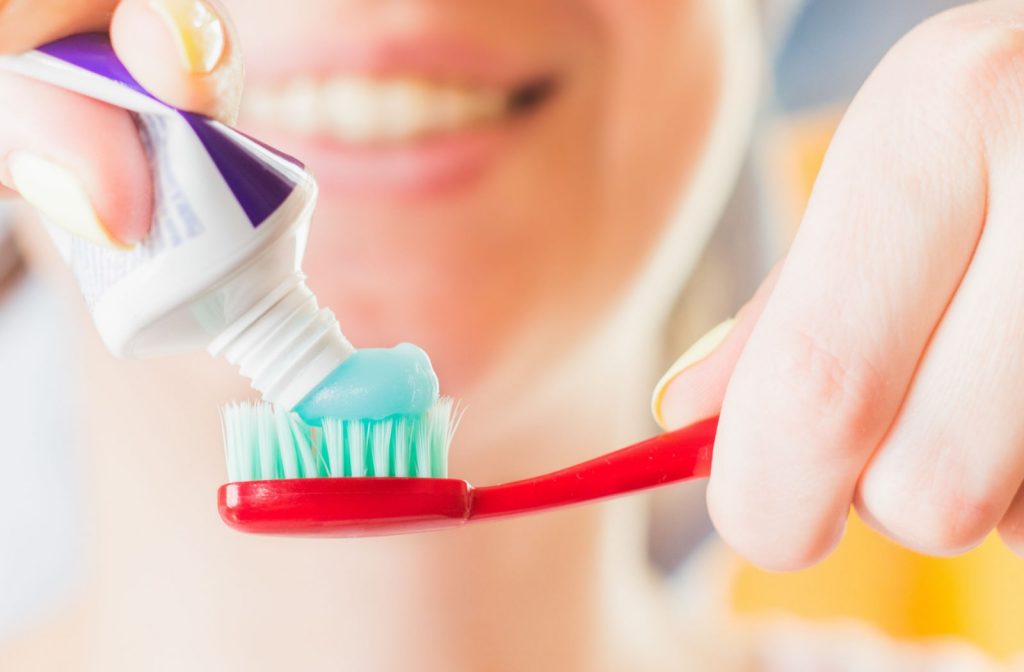Having a naturally white smile is rare, but a yellow tint can seem noticeable to you. Whitening your teeth can help brighten your smile. You already know that fluoride is in most dental health products, from toothpaste to mouthwash, but can it help reverse tooth stains?
Fluoride doesn’t whiten your teeth, but it can help prevent tooth decay, strengthen enamel, and protect against developing stains. Whiter teeth can be achieved through other oral health products and treatments.
Regular cleanings and an annual dental exam can help keep your oral health at its best, but if you want a brighter smile, our dental team can discuss the best whitening methods for your teeth and offer lifestyle tips to help keep them free from stains longer.
What Does Fluoride Do for Your Teeth?
Fluoride is a powerful mineral that helps to prevent the weakening of enamel and reduce your risk of developing cavities or gingivitis, the precursor to gum disease.
Strengthens Enamel
Enamel is the thin, hard outer cover of the tooth. Worn enamel leaves your teeth vulnerable to harmful bacteria from acids in your saliva. As these acids wear down your enamel, it leads to demineralization, but fluoride is a mineral that can remineralize the enamel and keep it strong to defend your teeth from cavities.
Prevents Tooth Decay
Fluoride can coat your teeth with a layer of protection against plaque and tartar buildup. As you eat and drink throughout the day, food particles and bacteria form plaque, accumulating on your teeth and below the gum line. Plaque can turn into tartar, a sticky film that leads to tooth decay and gum disease.

How to Incorporate Fluoride into Your Oral Health Routine
You can get fluoride from several sources. Some of the most common include:
- Toothpaste
- Mouthwash
- Varnishes
Fluoride treatments at the dental clinic are typically included in your cleaning every 6 months or at your yearly visit with your dentist.
How to Prevent Tooth Discolouration
There are different types of tooth discolouration, including:
- Extrinsic
- Intrinsic
Extrinsic staining is typical and only affects the enamel of the teeth. While most people assume all staining is yellow, the discolouration can also be brown or purple, depending on the cause. You can limit extrinsic staining by recognizing why your teeth are discoloured.
Intrinsic staining, which is located inside the tooth, can result from trauma, tooth decay, certain medication, and genetics. It doesn’t appear yellow, like most extrinsic tooth staining, and instead has a grey tint.
Food & Drinks
Some foods are more likely to cause staining than others. Coffee, black tea, and red wine can cause discolouration, and tomatoes, berries, chocolate, and other surgery foods can settle on your teeth and cause an increase in bacteria. Plaque and tartar buildup can cause staining on the tooth's surface.
Tobacco
Whether you’re a smoker or chew tobacco, black and brown stains can develop on the teeth from chronic tobacco use. The health and appearance of your teeth can be improved by quitting tobacco products.
Dental Hygiene
Brushing twice a day with fluoride, whitening toothpaste, flossing once a day, and using antibacterial mouthwash can keep your oral health on track to prevent cavities and gingivitis.
How to Whiten Your Teeth
Even though fluoride benefits your teeth, if you want a whiter smile, there are options for reversing discolouration and staining.
Whitening Toothpaste
Most toothpaste brands have a whitening variety for those who want to lighten the hue of their teeth. Regular use can offer the best results, but this option may not noticeably improve discolouration.
Teeth Whitening Strips
Whitening strips are a popular whitening product you can find at most drugstores and pharmacies. They’re a simple, straightforward method to remove stains, but if you have sensitive teeth, whitening strips may amplify those sensations.
Teeth Whitening Kits
Pre-packaged at-home whitening kits typically include a mouthguard and hydrogen peroxide gel or paste to help remove stains. You can find over-the-counter kits and similar products at your dental clinic.
Professional Whitening Treatment
In-office treatments are a highly effective whitening solution that's more individualized to your smile goals. Considering your tooth sensitivity and degree of staining, we can use the precise balance of hydrogen peroxide solution to safely achieve brighter teeth with fewer treatments.
Routine Dental Cleanings
Scheduling your cleanings every 6 months helps remove the hard-to-reach plaque and tartar buildup on the teeth and gums. Professional scaling, polishing, and fluoride varnish are great preventative measures to avoid deep staining on your teeth.
If you’re using at-home remedies or over-the-counter products to whiten your smile, inform your dental team so they can monitor your teeth for signs of heightened sensitivity and discuss your results.
Here for Healthy Smiles
While fluoride doesn't directly remove stains, it's an invaluable ingredient in dental care products to help keep your enamel strong and free from cavities. There are other options for teeth whitening you can try to reveal a smile you're confident about.
Visit SkyPointe Dental for your twice-a-year cleaning and annual dental checkup. We can answer all your questions about fluoride and help you find the best teeth whitening product or service for a healthy, beautiful smile.
If you’re new to Skypointe Dental, don’t forget to ask about our $1 new patient dental exam!
